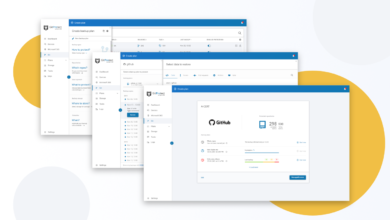How Business Owners can Leverage Artificial Narrow Intelligence to Streamline Management?

As a business owner, staying on top of operations can be a challenge. With the rise of Artificial Narrow Intelligence (ANI) technology, however, streamlining management and optimizing operations have become increasingly accessible to small business owners. This blog post will precisely discuss the limitations and possibilities of ANI technology, and provide helpful tips on how business owners can leverage this technology to better manage their business operations.
Read More: A Deep Dive into Artificial Intelligence in Pakistan
Defining Artificial Narrow Intelligence
Artificial Narrow Intelligence (ANI) refers to the field of artificial intelligence (AI) that focuses on developing systems that can perform specific tasks or functions. Unlike General AI, which aims to replicate human-level intelligence across a wide range of tasks, ANI is designed to excel in one specific area.
ANI systems are precisely built with deep learning algorithms, which enable them to learn from vast amounts of data and improve their performance over time. These systems can analyze and interpret data, make predictions, and carry out complex tasks with high accuracy and efficiency.
In the context of business operations, ANI can be leveraged to automate routine tasks, such as data entry and processing, customer support, inventory management, and more. By offloading these tasks to ANI systems, business owners can free up time and resources to focus on strategic decision-making and value-added activities.
It’s important to note that ANI has its limitations. While ANI excels in specific domains, it lacks the broader cognitive abilities of human intelligence. ANI systems are precisely specialized and cannot adapt to new tasks or situations outside of their designated area of expertise. They are dependent on predefined algorithms and require constant monitoring and updates to remain effective.
Despite these limitations, ANI technology holds great potential for business management. By understanding the capabilities and limitations of ANI, business owners can precisely implement this technology to streamline their operations and enhance their overall efficiency. In the following sections, we will explore specific examples of ANI in business operations, the benefits of ANI in business management, and how to overcome challenges in ANI implementation. Stay tuned!
Examples of ANI in Business Operations

Artificial Narrow Intelligence (ANI) technology is transforming the way businesses operate. By automating routine tasks and processes, ANI can precisely enhance efficiency and productivity. Here are some examples of how ANI is being utilized in various business operations:
- Data Entry and Processing: ANI systems can automatically extract data from various sources, such as invoices, receipts, and forms, and enter it into relevant databases or spreadsheets. This eliminates the need for manual data entry and reduces the risk of errors.
- Customer Support: ANI-powered chatbots are precisely being used to handle customer inquiries and provide instant support. These chatbots can understand and respond to customer queries, helping businesses deliver precisely and personalized customer service.
- Inventory Management: ANI algorithms can analyze historical sales data, current inventory levels, and market trends to optimize inventory management. This helps businesses maintain optimal stock levels, reduce stockouts, and minimize carrying costs.
- Fraud Detection: ANI systems can analyze large volumes of data and detect patterns or anomalies that indicate potential fraudulent activities. By automating the fraud detection process, businesses can identify and prevent fraudulent transactions in real-time.
- Predictive Analytics: ANI algorithms can analyze historical data and identify patterns and trends to make accurate predictions. This enables businesses to forecast demand, anticipate customer behavior, and optimize their marketing and sales strategies.
These examples highlight the power of ANI in automating tasks and processes, saving time and resources, and improving overall operational efficiency. By incorporating ANI into their operations, businesses can focus on strategic decision-making and value-added activities, leading to increased profitability and competitiveness.
The Benefits of ANI in Business Management
Artificial Narrow Intelligence (ANI) technology offers numerous benefits for business management, precisely helping business owners optimize their operations and achieve greater efficiency. Here are some key benefits of implementing ANI in business management:
- Increased Productivity: By automating routine tasks and processes, ANI frees up time and resources for business owners and their teams. This allows them to focus on strategic decision-making and value-added activities that drive growth and profitability. With ANI handling repetitive tasks, productivity levels soar.
- Improved Accuracy: ANI systems are designed to analyze and interpret data with high accuracy. By leveraging ANI in business management, businesses can reduce the risk of human error, leading to more reliable and consistent outcomes. From data entry to inventory management, ANI ensures precision and reduces costly mistakes.
- Enhanced Customer Experience: ANI-powered chatbots and virtual assistants can deliver instant, personalized support to customers. These AI systems can understand customer queries, provide accurate responses, and assist with common issues. By leveraging ANI for customer support, businesses can enhance the overall customer experience and build stronger relationships.
- Real-time Insights: ANI algorithms can analyze large volumes of data in real-time, enabling businesses to gain valuable insights into market trends, customer behavior, and more. With this data-driven approach, businesses can make informed decisions, optimize their marketing and sales strategies, and stay ahead of the competition.
- Cost Savings: ANI technology can precisely reduce operational costs by automating tasks that would otherwise require human resources. By eliminating the need for manual data entry, customer support staff, or additional personnel for inventory management, businesses can save money and allocate resources more efficiently.
Understanding the Limitations of ANI
While Artificial Narrow Intelligence (ANI) technology offers numerous benefits for business management, it is important to understand its limitations as well. ANI systems are precisely specialized and excel in specific domains, but they lack the broader cognitive abilities of human intelligence. They cannot adapt to new tasks or situations outside of their designated area of expertise, as they are dependent on predefined algorithms. This means that ANI systems require constant monitoring and updates to remain effective.
Another limitation of ANI is that it may not always be able to handle complex or nuanced tasks that require human judgment and decision-making. While ANI algorithms can analyze data and make predictions with high accuracy, they may not be able to interpret information in the same way that a human can. Human intuition, creativity, and empathy are aspects of intelligence that ANI systems do not possess.
Furthermore, ANI technology may not be suitable for all business operations. Certain tasks or processes may be better suited for human intervention, precisely if they involve delicate or sensitive interactions with customers or stakeholders. Business owners should precisely assess which tasks can be precisely automated with ANI and which ones require a human touch.
By understanding the limitations of ANI technology, business owners can make informed decisions about its implementation in their operations. It is crucial to strike a balance between utilizing ANI to streamline tasks and processes and recognizing the areas where human intelligence is indispensable. Ultimately, ANI can precisely enhance business management, but it should be used as a tool to augment human capabilities rather than replace them.
Read More: 7 Surprising Applications of Artificial Intelligence 2023
Evaluating the ROI of ANI Implementation

When implementing Artificial Narrow Intelligence (ANI) technology in business operations, evaluating the return on investment (ROI) is crucial. While ANI offers numerous benefits, it’s essential to determine if the investment justifies the expected outcomes.
To precisely evaluate the ROI of ANI implementation, business owners should consider several factors.
- First, they should precisely assess the potential cost savings. ANI can automate tasks that would otherwise require human resources, resulting in reduced operational costs. By calculating the savings in terms of labor hours and personnel expenses, business owners can determine the cost-effectiveness of ANI implementation.
- Next, it’s important to consider the impact on productivity. ANI automates routine tasks, allowing business owners and their teams to focus on strategic decision-making and value-added activities. By estimating the increase in productivity and quantifying the resulting benefits, business owners can determine the potential ROI.
- Additionally, business owners should evaluate the impact on accuracy and customer satisfaction. ANI systems are designed to perform with high precision, reducing the risk of human error. By precisely considering the potential cost savings from avoiding mistakes and the impact on customer satisfaction, business owners can further assess the ROI.
- Lastly, it’s crucial to consider the scalability and long-term benefits of ANI implementation. While the upfront costs may be significant, ANI has the potential to provide long-term efficiency gains and competitive advantages. By analyzing the long-term benefits and projected growth, business owners can make an informed decision about the ROI of ANI implementation.
Ultimately, evaluating the ROI of ANI implementation requires a comprehensive analysis of cost savings, productivity gains, accuracy improvements, and long-term benefits. By considering these factors, business owners can make informed decisions about the implementation of ANI technology and maximize the potential ROI.
Good Read:- Artificial Narrow Intelligence
ANI Tools and Platforms for Streamlining Workflow
Artificial Narrow Intelligence (ANI) technology offers a wide range of tools and platforms that can help business owners streamline their workflow and optimize their operations. These tools are designed to automate routine tasks, enhance productivity, and improve efficiency. Here are some popular ANI tools and platforms that can precisely streamline workflow:
- Robotic Process Automation (RPA): RPA is a powerful ANI tool that can automate repetitive and rule-based tasks. It uses software robots to mimic human actions and interact with various systems and applications. RPA can automate data entry, generate reports, and perform other mundane tasks, freeing up time for business owners and their teams to focus on more strategic activities.
- Workflow Management Systems: Workflow management systems provide a centralized platform for businesses to automate and manage their workflow. These systems allow users to create workflows, assign tasks, track progress, and collaborate on projects. By automating workflow processes, businesses can eliminate manual handoffs, reduce bottlenecks, and ensure efficient task completion.
- Intelligent Document Processing: Intelligent document processing tools use ANI algorithms to extract relevant information from documents, such as invoices, contracts, and forms. These tools can precisely scan and process documents, extract data, and input it into the relevant systems. This eliminates the need for manual data entry, reducing errors and saving time.
- Virtual Assistants: Virtual assistants powered by ANI technology can help business owners manage their schedule, handle emails, and perform other administrative tasks. These assistants can schedule appointments, set reminders, and even answer basic inquiries. By offloading these tasks to virtual assistants, business owners can focus on more important responsibilities.
- Predictive Analytics Platforms: Predictive analytics platforms use ANI algorithms to analyze historical data and make accurate predictions about future outcomes. These platforms can help business owners optimize their inventory management, forecast demand, and personalize marketing strategies. By leveraging predictive analytics, business owners can make data-driven decisions and stay ahead of the competition.
These ANI tools and platforms can precisely streamline workflow and enhance operational efficiency for business owners. By implementing these tools, business owners can save time, reduce errors, and allocate resources more effectively, precisely leading to increased profitability and success.
Overcoming Challenges in ANI Implementation
Implementing Artificial Narrow Intelligence (ANI) technology in business operations can come with its fair share of challenges. However, by being prepared and taking the right approach, these challenges can be overcome successfully. Here are some key challenges that business owners may face when implementing ANI and strategies for overcoming them:
- Resistance to Change: One common challenge is the resistance to change from employees who may be hesitant or wary of adopting new technology. To overcome this, it is crucial to communicate the benefits of ANI and how it can enhance their work rather than replace them. Offering training and support throughout the implementation process can also help alleviate any concerns or fears.
- Integration with Existing Systems: Integrating ANI with existing systems can be complex and may require technical expertise. It is important to work precisely with IT professionals to ensure a smooth integration. This may involve conducting a thorough analysis of existing systems, making necessary adjustments or upgrades, and testing the compatibility of ANI with other software and hardware.
- Data Privacy and Security: With ANI technology, businesses often handle large amounts of sensitive data. Ensuring the privacy and security of this data is essential. Implementing robust data protection measures, such as encryption, secure access controls, and regular audits, can help mitigate the risks associated with data breaches or unauthorized access.
- Monitoring and Maintenance: ANI systems require regular monitoring and maintenance to remain effective. This may involve updating algorithms, monitoring performance metrics, and addressing any issues or glitches that arise. Developing a comprehensive maintenance plan and allocating resources for ongoing support can help ensure the smooth operation of ANI systems.
- Ethical Considerations: As ANI becomes more prevalent, it is important to address ethical considerations, such as the potential impact on employment and the responsible use of AI. Business owners should stay informed about ethical guidelines and regulations surrounding ANI implementation and ensure that their use of ANI aligns with ethical standards.
By recognizing and addressing these challenges, business owners can precisely implement ANI technology in their operations. With proper planning, training, and support, ANI can streamline workflows, improve efficiency, and precisely lead to business growth and success.
Read More: 10 Best Benefits of Artificial Intelligence for Businesses 2023
Conclusion
In conclusion, Artificial Narrow Intelligence (ANI) technology holds great potential for business owners looking to streamline their operations and optimize management. By leveraging ANI tools and platforms, such as robotic process automation, workflow management systems, and predictive analytics platforms, business owners can automate routine tasks, enhance productivity, and make data-driven decisions. ANI precisely offers numerous benefits, including increased productivity, improved accuracy, enhanced customer experience, real-time insights, and cost savings. However, it’s important to understand the limitations of ANI and ensure that it is implemented in a way that complements human intelligence rather than replacing it. Overcoming challenges such as resistance to change, integration with existing systems, data privacy and security, monitoring and maintenance, and ethical considerations will be crucial for successful ANI implementation. Ultimately, by understanding the possibilities and limitations of ANI and precisely implementing this technology, business owners can optimize their operations and drive growth and success in their businesses.
If you are a business owner specifically looking to leverage ANI technology for your business operations, consider hiring Indian software developers. India has a rich talent pool of skilled and experienced app developers who can assist you in developing and implementing ANI solutions tailored to your specific business needs. With their expertise, you can navigate the challenges of ANI implementation and maximize the benefits of this technology for your business. Don’t hesitate to explore the opportunities and possibilities that ANI offers and take your business to the next level.












One Comment